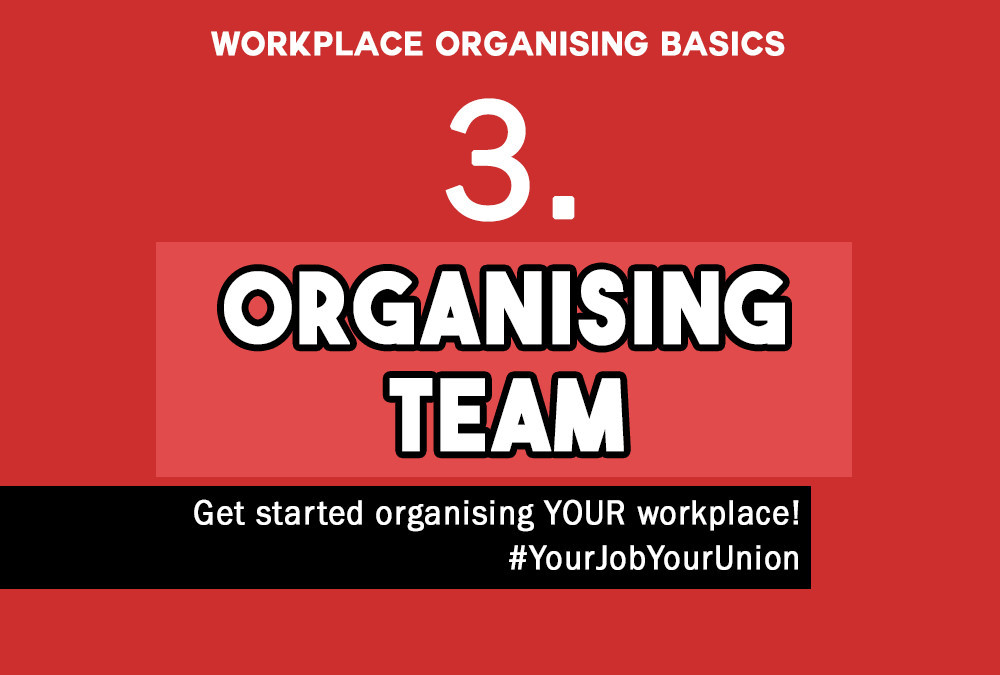The third in our workplace organising basics mini-series. So far you have learned how to map your workplace and how to have one-to-one conversations with your workmates. Now you need to make a team capable of fighting the boss!
Making the team.
With your social map and from the conversations you have had with co-workers, you should be able to identify colleagues who are trustworthy, influential in the workplace, and want to do something to resolve problems. These colleagues will be the basis of your workplace organising team.
The first step is to bring them together; have a meeting to introduce yourselves, and plan a set of ongoing tasks. You should try to include these workers in the mapping that you have already started, and help them have their own one-to-one conversations with other colleagues. Invite them to the IWW so you can all have training and receive ongoing support! Get them clued up so you can begin to act as a unit!
Now that you have a small team you should be able to spread across the workplace. Make use of all your skills, contacts, relationships, and clout! Talk to colleagues in different departments, zones, language and social groups, and learn about the main issues across the workplace.
You should meet regularly to discuss progress and to support and encourage one another. After each meeting everyone should have a task to complete that week. These tasks do not need to be daunting; they could be as simple as getting a phone number for one of the kitchen staff who seems pretty sound. Try to find a balance that keeps everyone involved and valued, while not being burned out. There is no need to rush, go at your own pace and be sustainable. But never be a talking shop!
Continue to invite trustworthy workers into the team. You will begin to gather a list of common grievances and you will get a feeling as to which groups and individual workers are angry and want to do something. Now it is time to think about your first campaign!
Your first campaign.
Look through your list of grievances. Which issues impact which workers? You might decide that you need more experience and confidence before going after a big problem, so you could practice by tackling a small and simple problem first. On the other hand, there may be one overriding problem that a lot of workers have, and for which the members of the organising team came together in the first place.
There is no perfect blueprint as to how you do this, but you need information about the issue itself. What is it specifically? Who does it impact primarily? Are there additional problems that are caused or made worse by it?
Think POWER: who has the ability to resolve the problem? Is there a reason for why they might they not want it to be changed? Think about the alternative, what you would like to happen instead.
The IWW advocates an escalating strategy. Start with the simplest, easiest, least risky tactic. Try a collective letter signed by all of the workers impacted, clearly stating the problem and what should be done to resolve it. Include a date for when you expect a resolution.
If this doesn’t work, you should progress with tactics that move into the terrain of direct action, starting with the least risky. Here are some direct-action tactics you could use. Remember that you can do so much more than strike!
Expect union-busting. Your employer will try to stop you from organising and campaigning, legally or illegally. This can take many forms: from hiring an “independent” consultant to kick issues into the long grass; getting workers and supervisors to organise against you; holding “captive audience” meetings; pressuring workers individually with sob-stories to guilt them out of taking action; and sometimes illegally dismissing you. Your workplace organising team needs to read up and be aware of the various tactics a boss will use and “inoculate” your colleagues so they are less effective. The Union-Busting Playbook is a fantastic resource that organisers should become well-versed with.
If you have manoeuvred around the union-busting and your campaign is successful, tell colleagues about it! These little victories not only make our work life easier, they give us confidence and show that we are not powerless! You can inform workers about wins in a subtle way, so that you do not bait the boss into retaliating against you. Though, of course, it is vital to continue to inoculate workers that the boss could start union-busting at any time. It is not worth telling the boss that “we are a union” until you cannot achieve anything else without needing to do so.
In this mini-series you have learned how to map your workplace, talk to colleagues about issues, and make a team to fight back! You now have the basic tools to build the power of the working class!
Get organising, fellow worker!
—
NEXT: Bonus hints and tips.
PREVIOUS: One-to-one conversations.
Join the IWW and reach out to the organising department and your local branch for support!
